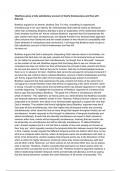‘Boethius gives a fully satisfactory account of God's timelessness and free will’.
Discuss
Boethius argued for an eternal, timeless God. For Him, everything is experienced
simultaneously in his own eternity. By understanding God's eternal nature as atemporal
rather than everlasting, Boethius attempts to give an explanation of the relationship between
God's timeless and free will. Kenny criticises Boethius’ argument that God experiences the
past, present and future simultaneously, and despite Anselm's four dimensionalist approach,
other criticisms from Swinburne and the overall problem of free will and its compatibility with
Gods attributes of omnipotence and omniscience, I will argue that Boethius does not give a
fully satisfactory account of God's timelessness and free will.
He does not
Boethius argues that God is atemporal, interpreting God's eternal nature to be timeless. He
proposes that God does not see past, present and future in the temporal terms as humans
do, but rather He experiences them simultaneously “as though from a lofty peak”. However,
on the problem of free will, Boethius argues that God being able to see our choices and
consequences does not restrict our free will because the concept of past, present and future
do not work the same for God as they do for humans. God has no foreknowledge because
there is no ‘in advance’ for God , therefore God cannot be accused of not being omniscient if
we have free will. Anthony Kenny criticises Boethius’ account of God's timelessness and free
will. Kenny argues that the notion of time being simultaneously present is incoherent.
Boethius’ argument that God experiences the past, present and future at the same time is
not logical as it would therefore mean that all time is happening at the same moment, which
is wrong. It would not make sense that something which has already happened is in fact still
currently happening. To highlight the incoherence of Boethius’ argument of a timeless God,
Kenny says that according to Boethius, “The great fire of Rome is simultaneous with the
whole of eternity”. This statement, as Kenny points out, demonstrates that Boethius excludes
any temporal distinction between events in time. However, Anthony Kenny's criticism can be
responded to by Anselm, who takes a four dimensionalist approach to support the view that
God is timeless. The problem that Kenny highlighted about Boethius’ argument was that if
God sees all time simultaneously, then that implies that all temporal events are occurring
simultaneously, which cannot be true as many things that happen throughout history are not
simultaneous. Anselm responds to this through his distinction of temporal simultaneity and
eternal simultaneity. Events that are eternally simultaneous are equal to God's presence,
however within time, events will be temporally simultaneous, meaning that two events can
be temporally non-simultaneous but still be eternally simultaneous. To defend Boethius’
point, Anselm explains that it is not that God is outside of time and viewing out choices as
they ‘truly are’, which arguably counters the temporal distinction between events that happen
in time. Instead, Anselm argued that different temporal events are distinct within time, but as
all time is contained within eternity, where all temporal events are simultaneous with God. In
terms of his dimensions, Anslem explains that temporal events are in the dimension of time,
which is within the higher dimension of eternity where they remain simultaneous with God
and all other events. Moreover, our future actions do not yet exist within time, but so always
exist in eternity. Therefore, Anselm concludes that God learns our future actions when he
observes them, proving that we do have free will. Therefore Anselm's argument maintains a
distinct relationship between temporal events and eternally simultaneous events by saying
that the eternal dimension contains the lower dimension of all events of temporality. This




